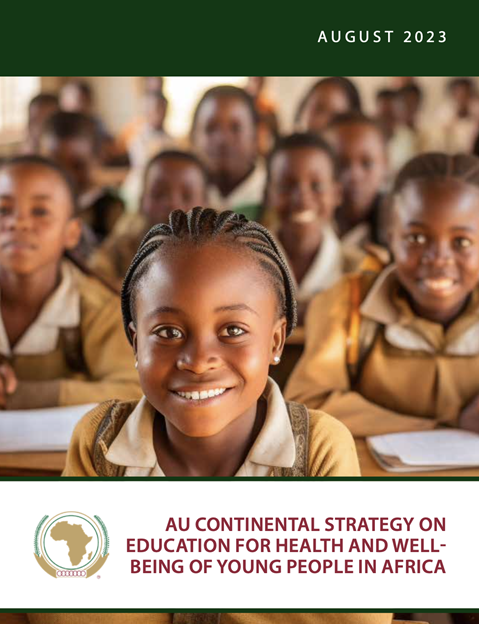AU continental strategy on education for health and well-being of young people in Africa

Overview
The health and well-being needs of young people are inextricably linked to their ability to participate in and attain education. Early and unintended pregnancy (EUP), HIV and AIDS, and gender-based violence (GBV) have an impact on the physical and mental health and well-being of young people, as do nutritional challenges and other causes of morbidity and mortality. These in turn affect their life prospects.
The African Union (AU) Agenda 2063: The Africa We Want serves as a call to action and lays out a strategic framework for the continent that is grounded in freedom, self- determination, and unity, with goals for an elevated standard of living and well-being, education, and good health and nourishment for all citizens. To deliver on the aspirations of Agenda 2063, the AU, in partnership with member states and key stakeholders, developed and adopted the comprehensive 10 -year Continental Education Strategy for Africa (CESA 2016-2025) to support the creation of a new African citizen who will be an effective change agent for the continent’s sustainable development. This strategy aims to contribute to achieving the Pan African vision of ‘’An integrated, prosperous and peaceful Africa, driven by its own citizens and representing a dynamic force in the international arena.” Moreover, on a continent where youth represent more than 60% of the population, the African Union Commission (AUC) and African stakeholders have placed youth at the centre of the strategy to ensure a stable and adaptive education system contributing to building young people’s capacities and skills for various aspects of life. Recognizing the need for an education-centred and education-led plan of action, the AU consequently established a sub-cluster for Education for Health and Well-being (EHW) under the Education Department’s Life Skills and Career Guidance. Aimed at ultimately serving CESA 2016-2025, in 2020 the sub-cluster determined that it would prioritize the development of a Continental Strategy on Education for Health and Well-being for Adolescents and Young People in Africa (EHW Strategy). This reflects the growing understanding of the need for strong country-level collaboration between the education and health sectors to ensure young people achieve improved health and well- being. Specifically, the EHW Strategy seeks to improve the reproductive, mental, and physical health of (children and) young people, while contributing to the achievement of education goals.

.png?sfvrsn=6d0e27cd_1)



